.png)
The polarization, the loss of confidence, the societal divisions and global challenges seem to multiply on a daily basis. Some thought leaders refer to this moment as a "metacrisis" (McGilchrist, 2021, p. 23), describing multiple systemic breakdowns happening simultaneously, driven by our collective struggle to make sense of the world and act together. In such a context, consensus-building isn’t a luxury. It's essential for democracies to function.
Make.org was created on the basis of this conviction. Through our large-scale citizen consultations and structured dialogue, we want to shift the focus from what divides people to what unites them. The goal is straightforward: turn shared priorities into concrete and positive actions.
Democracy thrives when citizens feel genuinely heard, understood and see their ideas reflected in decisions that affect their lives. This ongoing participation rebuilds trust in democratic institutions and creates what historian Pierre Rosanvallon calls "permanent democracy", where public action emerges from continuous, shared deliberation rather than exclusively from periodic elections. Making this happen at scale requires more than good intentions; it demands a clear and effective methodology.
Our approach centers, as mentioned, on large-scale citizen consultations designed to be inclusive, transparent, and action-oriented. Here is how it works:
Every consultation begins with a clear, compelling question about a major societal issue, something that matters to people's daily lives.
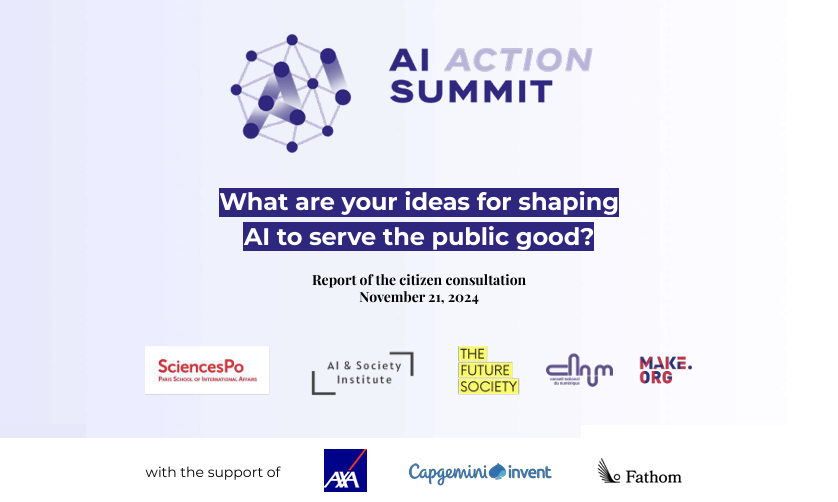
Citizens then contribute ideas and vote on others' suggestions. This simple mechanism proves powerful as each vote shows support, disagreement, or neutrality, creating a transparent, data-driven picture of where agreement lies. Targeted (social) media campaigns and partner networks help reach diverse audiences.
Once a consultation closes, our sociologists and data scientists analyse votes and proposals. Through this structured analysis model, similar ideas get grouped by topic to identify the most supported and most controversial suggestions. The crossing of a qualitative semantic analysis and a quantitative analysis of votes leads to a clear mapping of the state of public debate. In this mapping, each "idea" typically represents dozens, even hundreds of proposals defending the same idea, ensuring statistical reliability without distorting its intent.
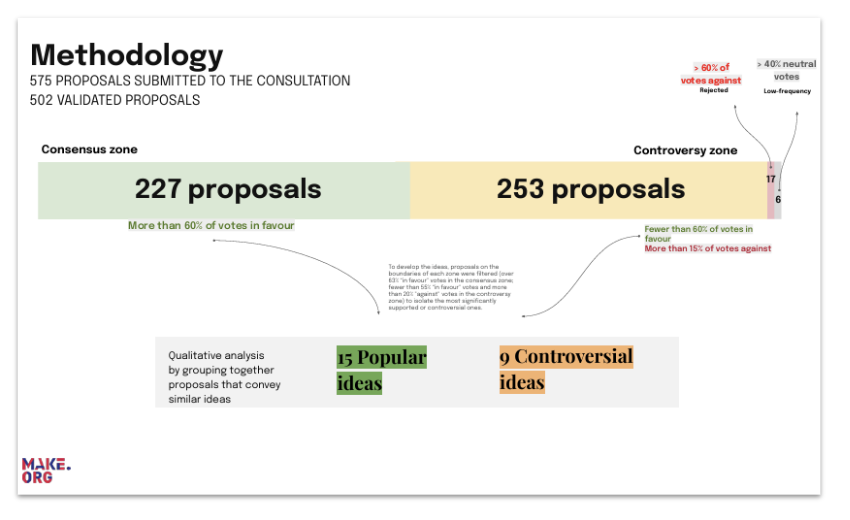
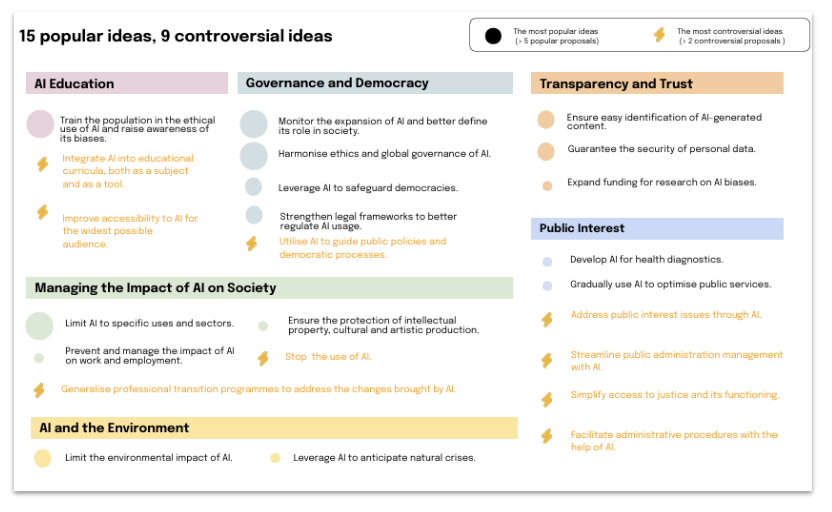
The insights gained from this process are then translated into a final report, tailored to the initiative's goals — policy recommendations, draft legislation, or civil society action.
The consultations before the 2024 AI Action Summit illustrate this process. Thousands of Europeans shared their views, leading to recommendations for stronger AI regulation and transparency. These citizen-backed proposals went directly to EU officials and summit organizers, translating public concerns about artificial intelligence into policy discussions. Read more in this article.
A striking example of how this methodology translates into real-world outcomes is the project Forum gegen Fakes – Gemeinsam für eine starke Demokratie by the Bertelsmann Stiftung in collaboration with a broad network of partners. Over 420,000 German citizens participated in this world-first initiative, addressing disinformation through both online consultation and deliberative citizen panels.
The evaluation report recently published by the University of Stuttgart proved a substantial impact: 70% of participants felt their input had a meaningful influence and media coverage reached over five million citizens. Besides, the citizen report was formally presented to Germany's Federal Minister of the Interior, signaling the project’s political relevance and institutional recognition.
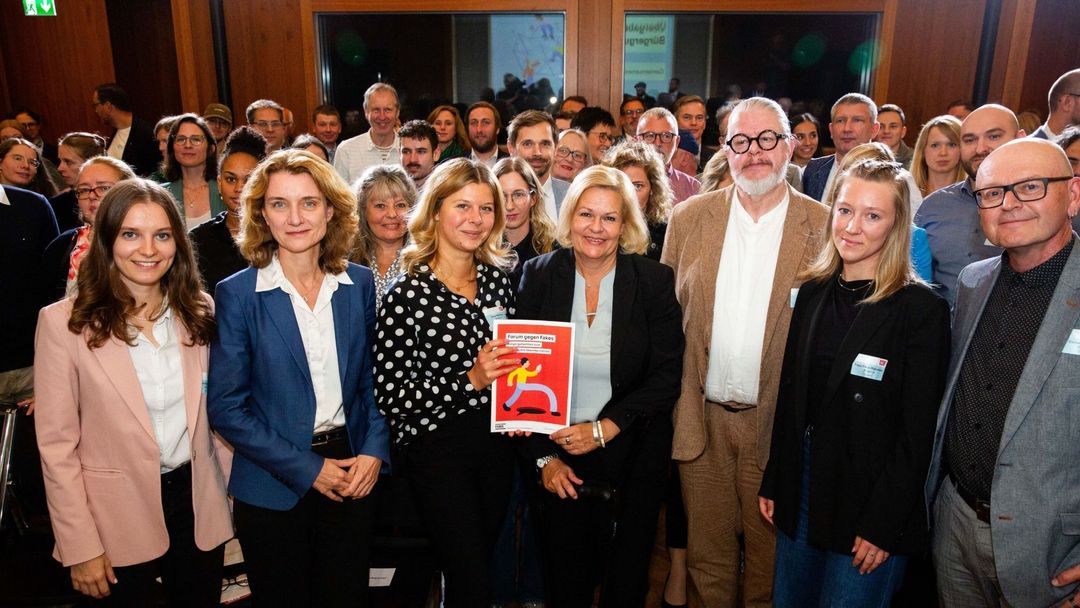
Several panel recommendations are already being implemented by educators, policymakers, and media professionals.
The principle of transforming citizen priorities into real-world impact also lies at the heart of another format developed by Make.org: the Great Cause.
In less than a decade, Make.org has launched more than 15 so-called Grandes Causes in France — multi-year action campaigns that translate citizen priorities into tangible societal impact. These initiatives have tackled major public interest topics such as combating violence against women, promoting access to culture, protecting the environment, ensuring equal opportunities for youth, and improving local living conditions. Each Grande Cause aims to build a broad coalition of stakeholders, from companies and institutions to NGOs, media, and startups, united in their efforts to turn civic consensus into action.
A strong example is the Great Cause “Tackling All Forms of Inequality Faced by Women.” More than 258,000 citizens participated in this consultation, and their input shaped a national action plan co-developed by 13 companies and 51 organizations.
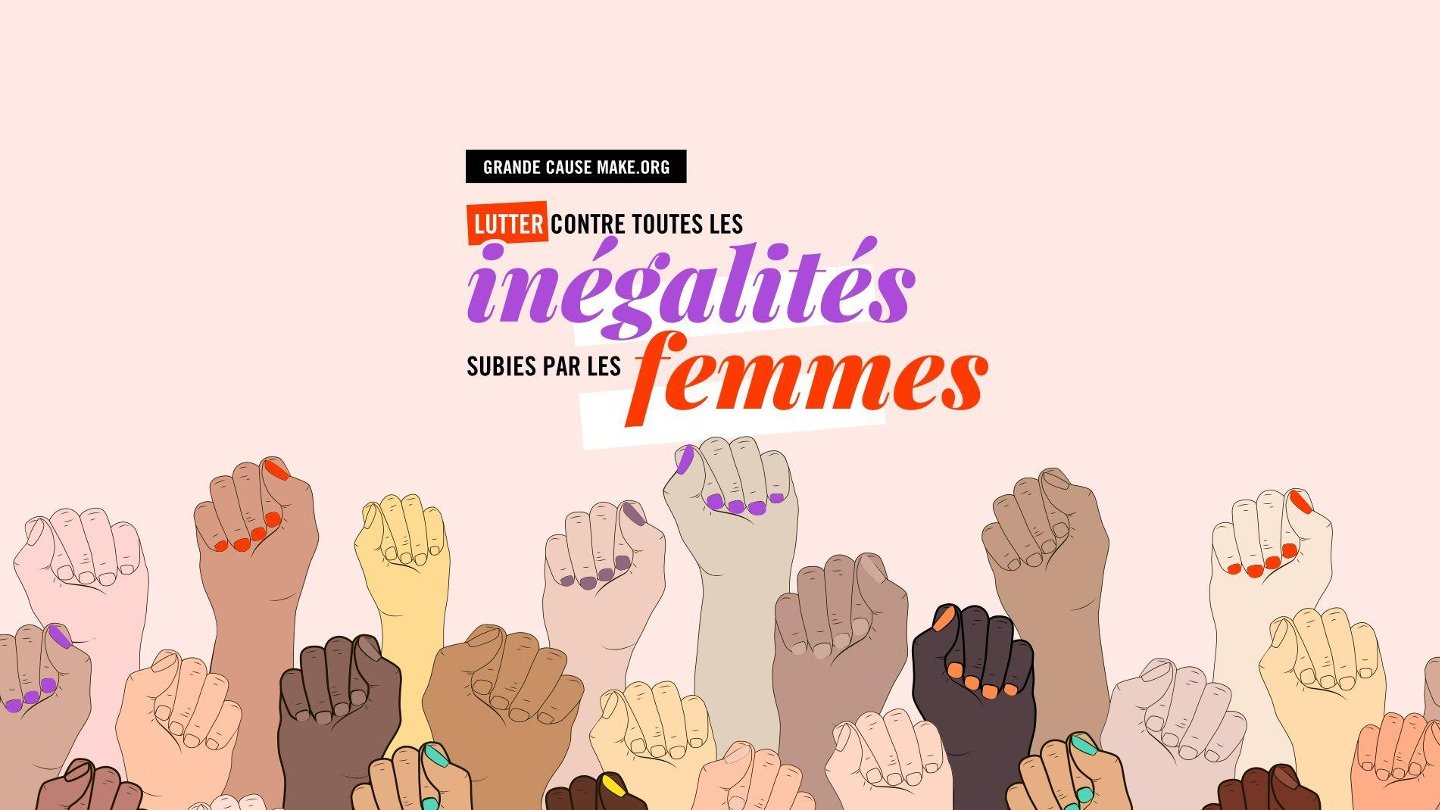
The Make.org Foundation subsequently supported 7 civil society-led initiatives to address these priorities, ranging from workplace equality programs to grassroots campaigns for gender representation, complementing public efforts and enhancing social cohesion.
Consensus is not only a national concern but gains power as it crosses national boundaries. The EurHope consultation brought together young Europeans to share their ideas for the future. Despite different languages and cultural contexts, similar proposals emerged: "Green public transport for all" and "EU-wide ban on single-use plastics" received widespread support in their respective countries, underlining the existence of a truly European civic consensus.
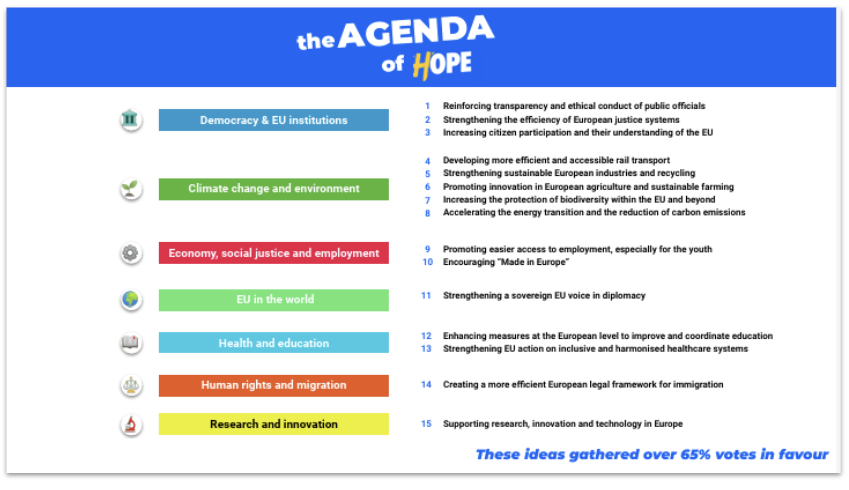
These citizen-generated ideas were not simply collected but brought into the heart of the democratic process. European political parties shared their reaction to the citizen's agenda so that young voters could see who they aligned most with. The results were published ahead of the European Elections and helped to shape a resolution co-created by youth representatives, turning civic participation into a concrete legislative impulse. The full outcomes and citizen priorities are detailed in the final EurHope report, available here.
The EurHope initiative, like the other examples explored in this paper, shows that consensus is not just about universal agreement. It is about shared intent. Finding a common purpose grounded in legitimacy and driven by a collective vision lies at the heart of Make.org’s methodology. We firmly stand with the belief that democracy must be participatory to be resilient and modern. When genuine opportunities exist for people to participate and shape decisions, individual voices become a powerful collective will. That does not mean Consensus can solve every problem. But it creates conditions for democratic societies to act with calm, inclusion, and purpose. The methodology works because it treats citizens as capable contributors rather than passive recipients of decisions made elsewhere.
That’s why our invitation remains: Participate. Share ideas. Help shape what comes next.
References McGilchrist, I. (2021). The Matter with Things: Our Brains, Our Delusions, and the Unmaking of the World (Vol. 1). Perspectiva Press.